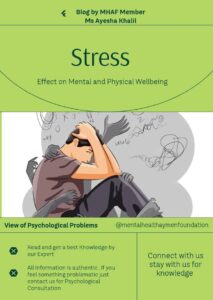Stress

Stress: Effects on Mental and Physical Well Being
Stress can be a daily part of life explained as the body’s reaction to different pressures or burdens. Stress can again be classified as an acute stress – which is generally considered to be constructive because it creates focus and increases stamina – stress which is long term has severe detrimental consequences on one’s mind and body.
Mentally, stress lasting for instance, many years lead to issues such as anxiety and depression. Emotional dysregulation happens and it interferes with rational thinking, heuristic abilities, and even memory. Cortisol, also referred to as the stress hormone, is produced when chronic stress activates the hypothalamic-pituitary-adrenal (HPA) axis and results in overactivity of the later. They further link high cortisol reactivity to higher proneness to psychological disorders like generalized anxiety disorder and the major depressive disorder.
Stress shows itself in physically… It compromises the immune system of an individual, this lead to easy fall sick like getting a cold, or an infection. Even cardiovascular health may be affected since stresses discovered to have negative impacts on individuals comprise arteries, blood pressure, heart disease, and stroke. Depression and other appropriate stress-induced behaviors, for instance, overeating, and substance abuse aggravate these risks.
Stress also has impact on the digestion and can result to more complications such as IBS and ulcers. In some cases, frequent stress may induce epigenetic changes — modifications of gene activity that also bear consequences for the long-term health of stressed individuals.
The key to optimizing people’s health is the ability to minimize stress. Some of the ways about which research has indicated will help reduce its impact include practicing mindfulness, taking up exercises and exercising support from the social circles. Stressors can be cognitive or situational and such professional practices as cognitive-behavioral interventions can enable a person to reframe stressors.
Thus, stress is a normal and an inherent(\’s) part of our life, but a certain and special stress affecting our mental and physical health points to the need to confront it. It clearly shows that self management help people to lead healthier and better lives.
